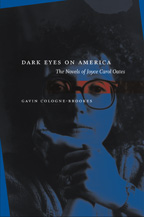
296 pages / 6.00 x 9.00 inches / none
Literary Criticism | Women's Studies
Joyce Carol Oates is America's most extraordinary and prolific woman of letters. In Dark Eyes on America, Gavin Cologne-Brookes illuminates the vision of this remarkable master of her craft, finding evidence in her novels of an evolving consciousness that ultimately forgoes abstract introspection in favor of a more practical approach to art as a tool for understanding both personal and social challenges. With her clear-eyed perception of human behavior, Oates has for decades offered unhesitating explorations of genre, topic, and style--making her an inevitable if somewhat elusive subject for critical assessment. Cologne-Brookes's conversations and correspondence with Oates, his close textual study of her novels, and abundant references to her essays, stories, poetry, and plays result in a work that critically synthesizes the layers of her writing. This comprehensive yet accessible study offers an essential analysis of one of the twentieth century's most significant writers.
Gavin Cologne-Brookes is an emeritus professor at Bath Spa University. Also a painter, he divides his time between England and France. His previous books include The Novels of William Styron: From Harmony to History; Dark Eyes on America: The Novels of Joyce Carol Oates; and Rereading William Styron.
“A major work not only in the scholarship on Oates but also in the application of pragmatist theory to literary analysis. Moreover, its wit and readability make it suitable for students who want to see a model of pragmatist criticism.”—Tulsa Studies in Women’s Literature
“This is a sound and engaging book that creates a balanced overview of Oates's career while tackling the question of her role in the wider community. What most recommends Cologne-Brookes's book is the liveliness and clarity of his reading of the novels.”—Modern Fiction Studies
“A thoughtful, thorough study which . . . encourages readers to re-examine Oates's novels within a philosophical context.”—Journal of the American Studies Association of Texas
Found an Error? Tell us about it.